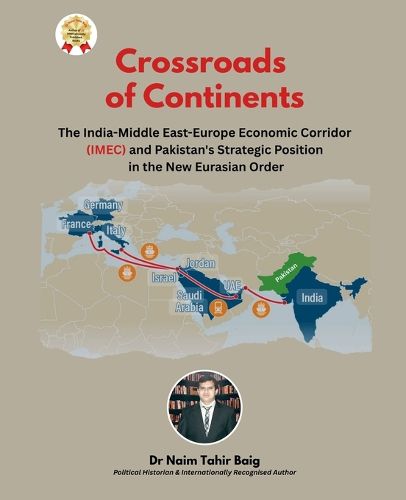Readings Newsletter
Become a Readings Member to make your shopping experience even easier.
Sign in or sign up for free!
You’re not far away from qualifying for FREE standard shipping within Australia
You’ve qualified for FREE standard shipping within Australia
The cart is loading…






This title is printed to order. This book may have been self-published. If so, we cannot guarantee the quality of the content. In the main most books will have gone through the editing process however some may not. We therefore suggest that you be aware of this before ordering this book. If in doubt check either the author or publisher’s details as we are unable to accept any returns unless they are faulty. Please contact us if you have any questions.
Book Description
Crossroads of Continents The India-Middle East-Europe Economic Corridor and Pakistan's Strategic Position in the New Eurasian Order By Dr Naim Tahir Baig provides a comprehensive analysis of one of the most significant geopolitical developments in contemporary South Asia: the emergence of the India-Middle East-Europe Economic Corridor (IMEC) and its implications for Pakistan's strategic position.
In this meticulously researched volume, Dr. Naim Tahir Baig examines how IMEC-announced during the G20 Summit in September 2023-represents a potential reshaping of regional connectivity patterns that have historically positioned Pakistan as a natural geographic bridge between South Asia, Central Asia, and the Middle East. The book places this development in the context of China's Belt and Road Initiative (BRI) and its flagship project in South Asia, the China-Pakistan Economic Corridor (CPEC).
Drawing on extensive research, diplomatic insights, and economic analysis, Dr. Baig explores how Pakistan can navigate this complex geopolitical landscape, arguing that isolation is not a viable option for a country whose geographic destiny lies in connectivity. The book outlines practical strategies for engaging with IMEC while preserving the strategic relationship with China through CPEC, reforming internal connectivity, exploring alternative corridors, and developing a comprehensive strategic framework that balances security imperatives with economic development needs.
This timely work will be invaluable for policymakers, diplomats, scholars, and anyone seeking to understand the evolving dynamics of economic corridors and their profound implications for regional power balances in the emerging Eurasian order. As great power competition intensifies across Asia, Dr. Baig's analysis offers a blueprint for how middle powers like Pakistan can maintain strategic autonomy while leveraging their geographic position for economic development and regional influence.
$9.00 standard shipping within Australia
FREE standard shipping within Australia for orders over $100.00
Express & International shipping calculated at checkout
This title is printed to order. This book may have been self-published. If so, we cannot guarantee the quality of the content. In the main most books will have gone through the editing process however some may not. We therefore suggest that you be aware of this before ordering this book. If in doubt check either the author or publisher’s details as we are unable to accept any returns unless they are faulty. Please contact us if you have any questions.
Book Description
Crossroads of Continents The India-Middle East-Europe Economic Corridor and Pakistan's Strategic Position in the New Eurasian Order By Dr Naim Tahir Baig provides a comprehensive analysis of one of the most significant geopolitical developments in contemporary South Asia: the emergence of the India-Middle East-Europe Economic Corridor (IMEC) and its implications for Pakistan's strategic position.
In this meticulously researched volume, Dr. Naim Tahir Baig examines how IMEC-announced during the G20 Summit in September 2023-represents a potential reshaping of regional connectivity patterns that have historically positioned Pakistan as a natural geographic bridge between South Asia, Central Asia, and the Middle East. The book places this development in the context of China's Belt and Road Initiative (BRI) and its flagship project in South Asia, the China-Pakistan Economic Corridor (CPEC).
Drawing on extensive research, diplomatic insights, and economic analysis, Dr. Baig explores how Pakistan can navigate this complex geopolitical landscape, arguing that isolation is not a viable option for a country whose geographic destiny lies in connectivity. The book outlines practical strategies for engaging with IMEC while preserving the strategic relationship with China through CPEC, reforming internal connectivity, exploring alternative corridors, and developing a comprehensive strategic framework that balances security imperatives with economic development needs.
This timely work will be invaluable for policymakers, diplomats, scholars, and anyone seeking to understand the evolving dynamics of economic corridors and their profound implications for regional power balances in the emerging Eurasian order. As great power competition intensifies across Asia, Dr. Baig's analysis offers a blueprint for how middle powers like Pakistan can maintain strategic autonomy while leveraging their geographic position for economic development and regional influence.